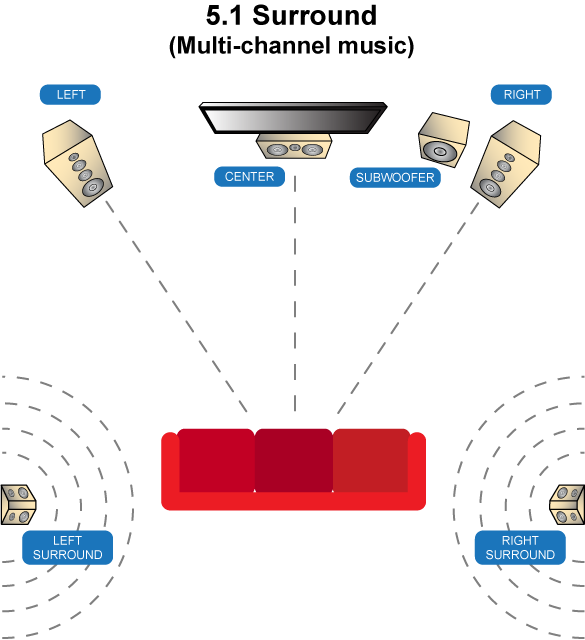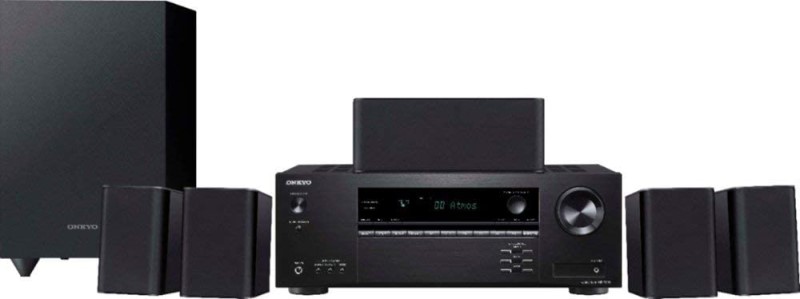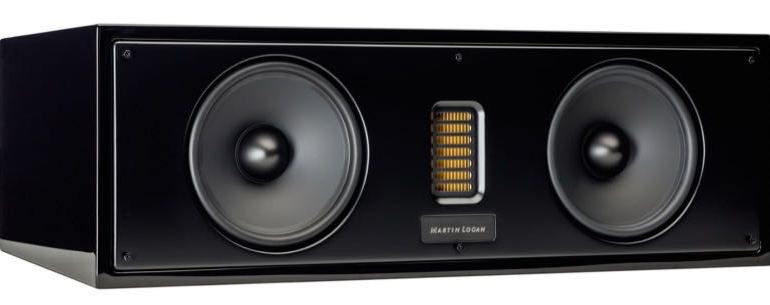Why Your Center Channel Speaker Isn’t Important
You’ve heard it said (or read it written) probably thousands of times before. The center channel is the most important speaker in your system. “That’s where all the vocals come from,” they say. If you can’t hear the voices, how will you understand what is going on? Clearly, the most important speaker in your system, right? Wrong. We are here to tell you that the center channel speaker is the LEAST important speaker in your system.
The Center Channel Speaker can be Removed and you Lose Nothing!
Run your receiver’s auto-setup and leave off one speaker. You choose. If you remove your surround back speaker or subwoofer, you can probably still run the auto-setup. But if you try and remove the front left or right or one of the surrounds, and the auto-setup will fail. It just doesn’t know how to handle it. Not so with the center channel.

Welcome to the wonderful world of the phantom center. When you don’t have a center channel, your receiver will matrix the sounds meant for the center into the front left and right speakers. You know this as stereo imaging and it is something your front speakers do very well. This preserves all the center speaker information so that NONE is lost. Drop out a surround speaker or a subwoofer, and some information will be lost. And don’t talk to me about how you have full-range speakers. We’ve already discussed how you don’t and, even if you did, they are in the wrong place for bass. You are definitely losing something by omitting a subwoofer in your system.
The once caveat here is that some receivers can run in 6.1 instead of 7.1. This would preserve all the surround back information. I’ll give you that. But who is running a 6.1 system these days? With the possibilities of slap-echos making your surround back sound seem like they are coming from the front, 6.1 is often more trouble than it is worth.
The Genesis of Bad Advice
Why do people say the center speaker is so important? This advice came from the days of Home Theater in a Box sets. Those sets were inexpensive, cheaply made, and often didn’t sound very good. People would look at those sets and buy the one with the biggest center speaker. They’d recommend those systems saying, “Most of the most important sounds are coming from the center anyhow, so buy the one with the biggest center.”

This advice makes perfect sense in context. On those inexpensive speaker sets, adding a slightly larger and more capable center can offset any dialogue intelligibility issues you might encounter. Plus, the rest of the speakers sucked so a person buying these sets really only cared about dipping their toe into surround sound while making their system louder. But out of context, the advice breaks down. If you have capable front speakers, the center becomes much less important.
The Case for the Center Channel
So if the center channel speaker isn’t important, why do we have them? Well, there are obvious advantages to incorporating a center channel. First, to create a convincing phantom center image, the listener has to be seated between the front speakers. Preferably centered between them. That is rarely the case. The center channel speaker locks the voices near the display.
In larger home theaters, a center channel can help with side to side pans. Our ears are much more discerning locating sounds in front of us. If your front left and right speakers are placed far apart, there can be a “gap” in the sound as it pans from side to side. This is why we are so worried about getting three front speakers that are timbre matched. Timbre matching means that the speakers sound the same as each other. We do this by buying three identical speakers or (more likely) buying a center channel that was voiced by the manufacturer to match their front speakers.
Lastly, there are real, genuine reasons for wanting a center channel. With a center channel in place, you can increase the volume of the vocals outside of anything else. For those with hearing issues, this can be a real boon. There is literally no other way to boost just the vocals without a center channel.
Just Because your Center Channel Speaker isn’t Important, Doesn’t Mean you don’t Need One
While your center channel speaker isn’t important for getting all the sounds you were meant to get, it is an important part of a fully functioning home theater. It locks the center channel sounds near the display, it helps with side to side pans, and it isolates the vocals so that you can change just the volume of the speakers. For some, these are invaluable. But blanket statements like, “The center is the most important speaker in your system,” are demonstrably false. Center speakers are nice to have. Some might think of them as essential. But they are the only speaker that can be removed from your system without losing one bit of information. For that reason, we believe that the center channel speaker isn’t important.



My husband bought a Yamaha an Onkyo. He likes the center channel for movies. It’s truly makes it sound like we are in a movie theater. He has the 7.1. you need the center channel for surround sound. Unless you want stereo sound then you don’t need the center channel..
What they mean by “the most important” is that if you’re running one, it’s the most important one in terms of quality. Its quality is the most significant out of all the speakers as it plays a large portion of the sound. If you run a poor one, you’re probably better off without one at all, as your left/right speakers would play those sounds better.
@Sandi: I think you missed the point. You are still getting surround without the center. You are still getting all the information you get with a center. It’s just pushed to the two front speakers but they will naturally emulate a center soundstage. If you sit correctly between the two fronts, it will sound just like having a fantastic center – as fantastic as your two fronts that is.
The reason a center channel is important is that unless you are listening with headphones, when a sound is coming from both left and right (as you say, “phantom center”), you will get an interference pattern along the horizontal axis. That means unless you are sitting dead center, for a particular frequency, your right ear might be in a node while your left is in an antinode (completely dead). Humans are extremely good a perceiving horizontal lobing errors like this so it is definitely noticeable. The presence of a (mostly) single center source enables more accurate sound from more listening positions.
I tried not using a center channel speaker two decades ago. If your right and left channel speakers are set wide (as in a good-sized home theater), then you need a center channel speaker. Otherwise, the sound is spread out too wide (even though all the same sound is there). It doesn’t sound normal as the dialogue is from a wide area instead of specific to the people on the screen. A proper setup puts dialogue mainly in the center unless the person speaking is off to one side. In fact, the dialogue follows the person speaking. If you do not have a center channel speaker, then the dialogue is not concentrated on the person speaking, but spread out. It is NOT the same!
Yes, you can get a good phantom center image without the center channel. However, depending on your Left and Right speakers and how wide they image it’s normally only good for the person sitting dead center in between your left and right speakers. If you are the only person watching the movie and you sit in the sweet spot great, however, if you have friends over to watch and they sit beside you or outside the very narrow sweet spot then you’re are way better off with a good center channel that can deliver a good center image to a wide area.
I think in all likelyhood, in an average home, with a dedicated room or not, there will be just one person who cares or notices the presence or absence of a centre speaker. Everybody else will be just enjoying the movie. Don’t spread the fronts too wide, sit yourself at the point of the triangle, and you can enjoy it too. The perfectly presented stereo image can place sound as if you could reach out and touch it. If you’re sat to the side, chill out, you’re with friends or family – just enjoy the movie.
This article is terrible. Phantom basically works for mlp that’s it